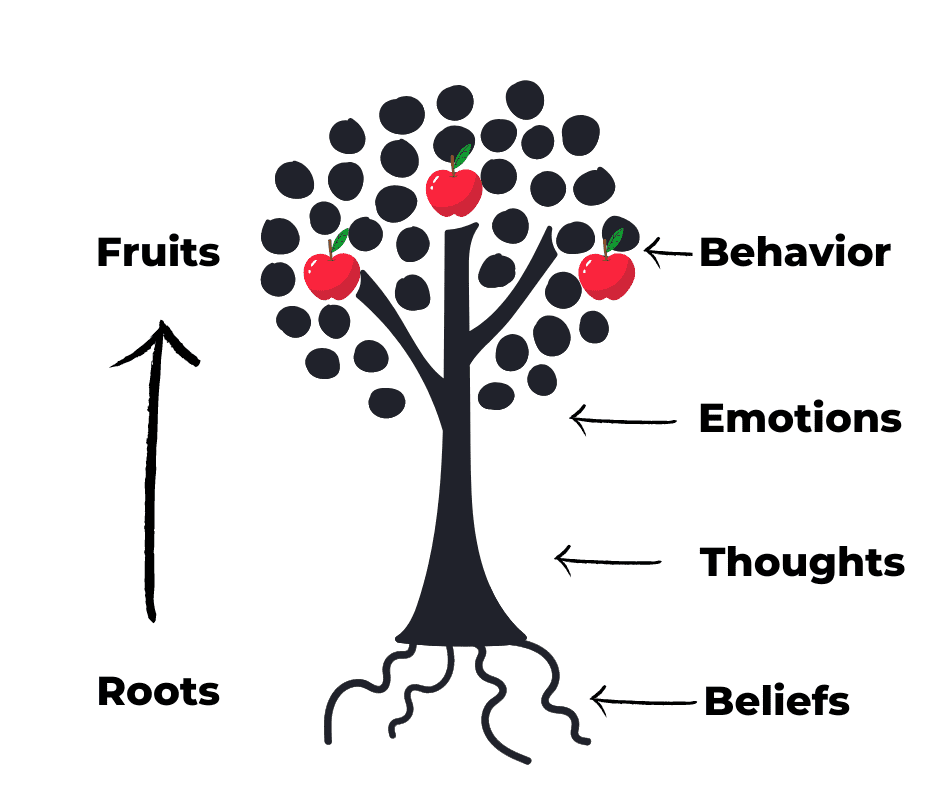About Author
Brett's writing has been featured by outlets like Outreach Magazine, Church Tech Today, and the Unstuck Church Group. Brett's courses on church marketing have over 10,000 students in 143 countries. Brett is also the author of The Digital Ministry: Reaching the ends of the earth without leaving home and is the marketing director at Clickmill.co. Brett has consulted with ministry leaders internationally, helping them create custom marketing strategies that get results. After four years of Christian college, Brett worked at Christian discipleship schools, Christian camps, and was a Youth Ministry Directory at the Salvation Army. He later spent six years in sales and marketing. Through Clickmill, Brett helps ministry leaders implement effective digital marketing strategies so they can reach more people, more effectively. Brett and his wife Siomara live in Honolulu, HI.
Beliefs, Thoughts, Emotions, Actions (EDIT)
Let’s look at the actual process of manifestation as it is revealed through the study of psychology.
As we know from an earlier lesson, manifestation is the process of bringing out what is inside of us.
The behavior that results comes from a good idea or bad idea and will ultimately produce a good result or bad result in your ministry.

The fruit we create in our lives and ministries is ultimately a manifestation of our beliefs.
Psychologically speaking, there are 4 steps to this Biblical process.
- Beliefs
- Thoughts
- Emotions
- Behavior (Fruit)
Let’s look at this process more in-depth.
Beliefs: People rarely challenge their most deeply helped beliefs. The most deeply held beliefs you hold are called Core Beliefs. Most of our core beliefs are so ingrained we don’t even know we have them. These beliefs are the source of the majority of the pain, joy, fear, etc that people will feel in their lifetimes and they are the most heavily guarded parts of a person. Here are a few examples of core beliefs you are already familiar with:
- “God doesn’t love me”
- “I’m loved”
- “God is evil”
- “God is a loving father”
- “I’m unlovable”
- “I’m shameful”
You have core beliefs on every subject you can imagine – especially ministry and subjects related to doing ministry.
These beliefs filter the way you think about everything, including yourself, and effect how you see everything in your life. Almost all of your thoughts flow directly out of the filter that is your beliefs.
Side Note: The church, governments, and other establishments attempt to change people from the outside (behavior) in. Christ changes people from the inside out. If you want to share the gospel in a way that creates internal change that spreads through the entire being of that person – you have to understand how people function according to natural law so you can utilize methods that increase the likelihood you will create deep internal change.
Thoughts: Our thoughts are what happen inside our head. Some psychologists refer to our thoughts as “self-talk.” These are the things we think inside to ourselves, such as, “Wow! I’m smart. I did a great job on that”, or, “Oh my gosh! I am so stupid! How could I have screwed that up again?!” As you can see, thoughts can be positive or negative – true or false – helpful or unhelpful. This is going to be important as we continue to understand why body language works.
Each time we allow a belief to be reinforced through a thought – we add a brick onto a stronghold that lives in our mind.
This is why Scripture instructs us to tear down arguments and ideas that set themselves up against God.
“For though we live in the world, we do not wage war as the world does. 4 The weapons we fight with are not the weapons of the world. On the contrary, they have divine power to demolish strongholds. 5 We demolish arguments and every pretension that sets itself up against the knowledge of God, and we take captive every thought to make it obedient to Christ.” -2 Cor. 10:3-5
Each time we reject a false, toxic, negative, or unhelpful belief that tries to enter our mind in the form of a thought we are taking a brick off the stronghold that keeps us enslaved. We should then reinforce a true belief in place of the false one.
This is the internal process the Bible refers to when it says:
Do not conform to the pattern of this world, but be transformed by the renewing of your mind. Then you will be able to test and approve what God’s will is—his good, pleasing and perfect will. -Romans 12:2
AND
“Finally, brothers and sisters, whatever is true, whatever is noble, whatever is right, whatever is pure, whatever is lovely, whatever is admirable—if anything is excellent or praiseworthy—think about such things.” – Philippians 4:8
As thoughts accumulate into a stronghold (whether it’s a godly or toxic stronghold) those thoughts begin to dominate our minds and begin to bleed into our emotions.
Emotions: Our emotions are how we feel. As we mentioned before, our emotions are generally created by the dominating thoughts we hold in our mind. An event that would fill one person with hatred might prompt a different person to express peace and forgiveness. This brings Jesus’ words while on the cross to memory, “forgive them for they know not what they do.” If you are like me – you might have some different words to say.
Abnormal Psychology Example: The root causes of clinical depression are chronic feelings of hopelessness and worthlessness. Consider how a child ends up feeling hopeless and worthless. One way this can happen is when parents abuse the child; whether it is done verbally, physically, or emotionally. The child begins to think about themselves in the same way they have been treated because they begin to believe the lies that are said about them. They tell themselves (in their thoughts/ self-talk) that they are stupid or dumb just as a parental figure in their life may have called them. Some children who are poorly cared for think that nobody could ever love them and they assume it is because they believe they are somehow “bad”. Self-talk like this has a direct impact on the child’s emotional state. As the negative thoughts begin to form a stronghold in the child’s mind the child also begins to feel worthless and hopeless. They feel worthless because they think and believe they are not worthy of love. They feel hopeless that they will ever get out of their situation or because they think they will never be loved.
Behavior Lastly is our behavior. It’s what we do. There are two types of behavior.
1) The first type of behavior is the kind we are aware of; conscious behavior. This is a situation where you feel frustrated but you are internally aware that showing love is the best course of action, so you intentionally choose this type of behavior.
2) The second type of behavior happens but you are not aware of it; this behavior is subconscious. These are the actions that you automatically take all day every day that show love because your beliefs, thoughts, and emotions have cultivated the type of character that automatically engages in loving actions.
Abnormal Psychology Example: Continuing the previous example, as these feelings of hopelessness and worthlessness overwhelm the child, clinical depression sets in. We then begin to see the behavioral indicators we would expect from children suffering from clinical depression; change in diet, loss of motivation, change in sleeping habits, or more severe signs such as self-mutilation, thoughts of suicide or attempted suicide.
Now I know that some of this was pretty heavy but stick with me.
In order to generate healthy fruit in your ministry, we must have beliefs in our minds that support fruit generation.
[Side Note: In addition to this, in order to change the lives of the people in your ministry for the better, not only do you need to have the correct beliefs but you need to understand how to change their beliefs. We will address this in the section on sharing the gospel.]


Leave a Reply